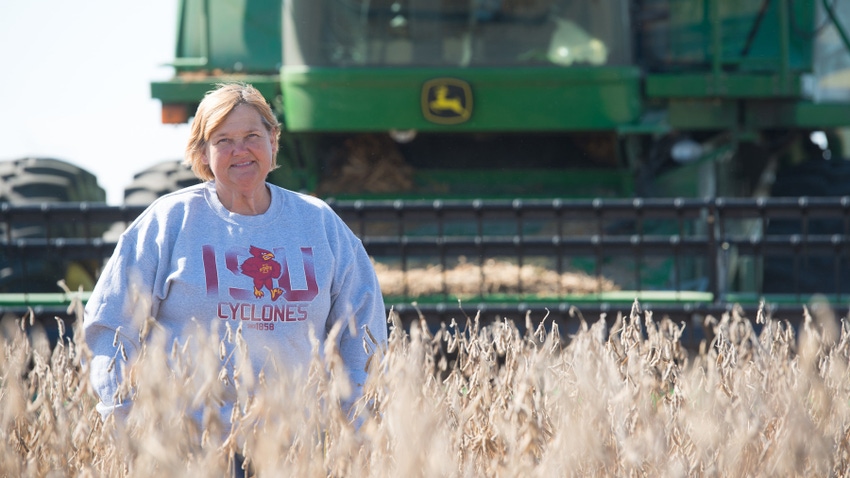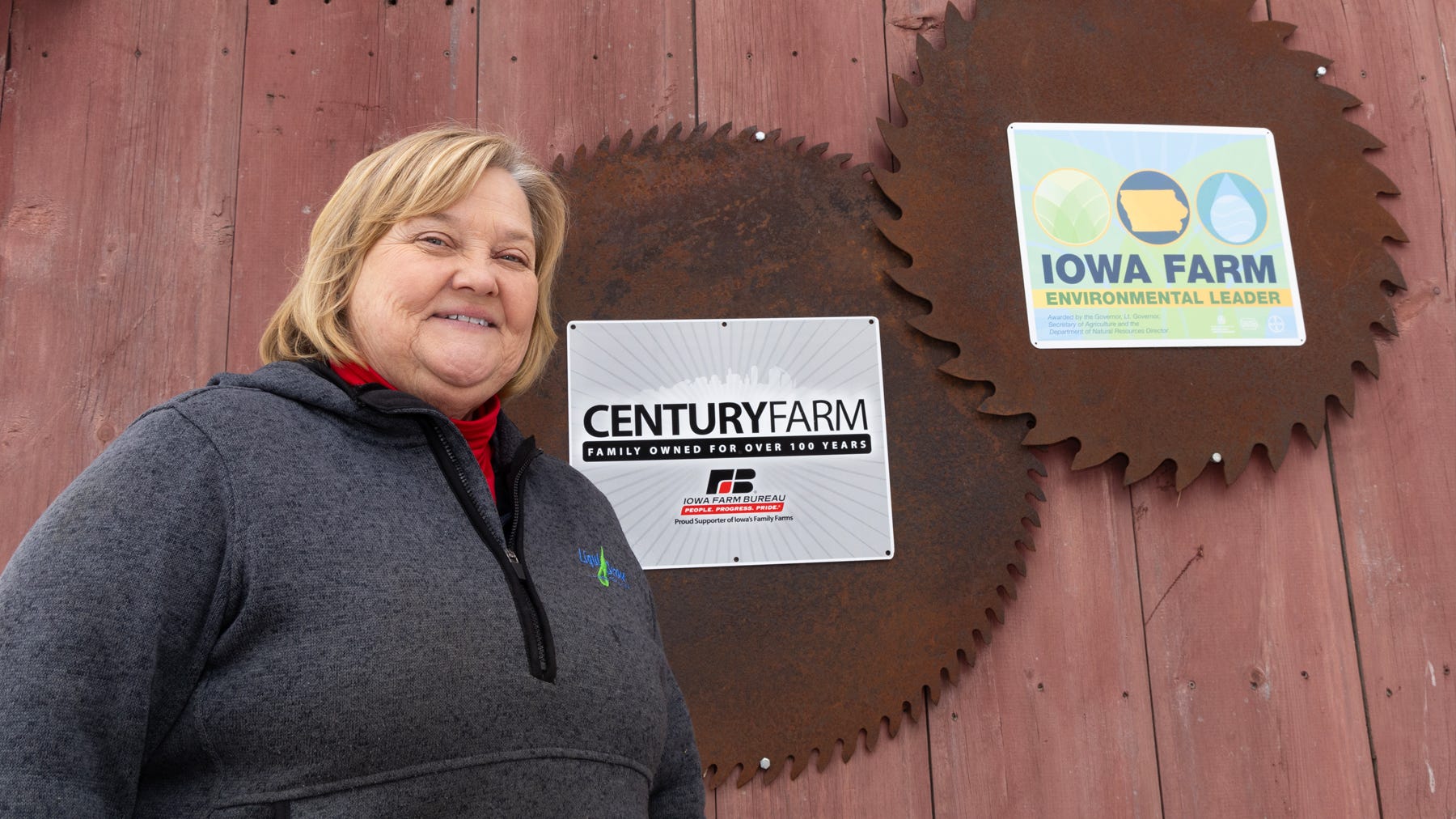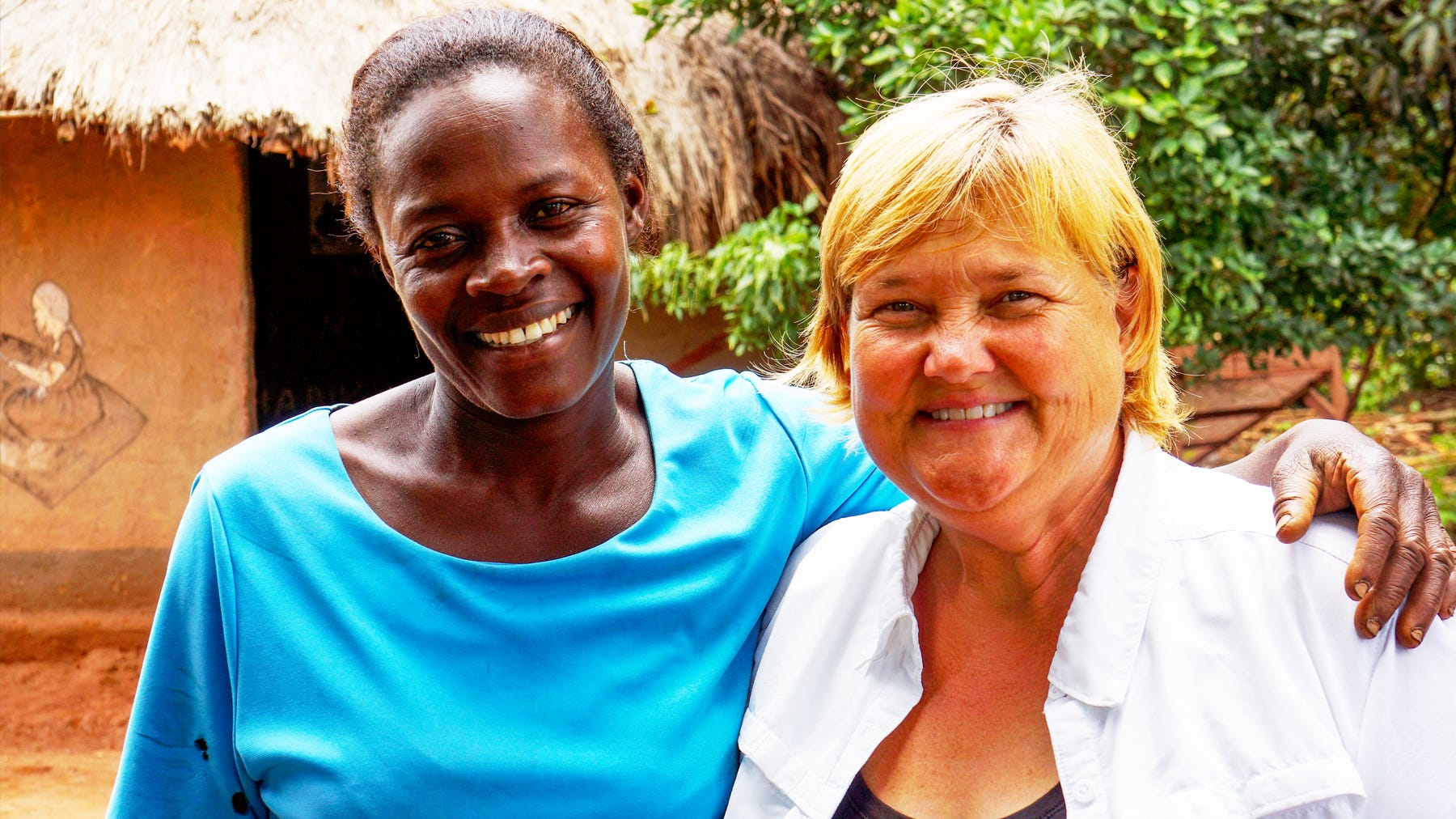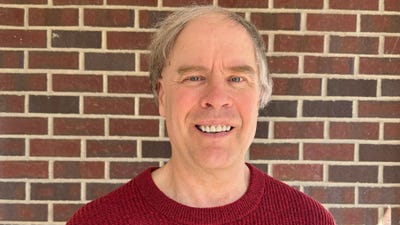
At a Glance
- Setting goals, knowing costs of production and choosing inputs have led to April Hemmes being a 2024 Iowa Master Farmer.
- She holds the line on machinery costs until it’s no longer practical to repair them.
- Her grandfather and father formed trusts, allowing Hemmes to buy land at a fair price from her siblings.
Ask April Hemmes how she’d like to be remembered, and you’d think she’d mention her stint as a United Soybean Board director. Or maybe her Lifetime Achievement Award from Iowa Women in Agriculture would surface. How about her being a Franklin County Iowa 4-H Hall of Famer?
Nope.
“My laughter,” says Hemmes, a Hampton farmer. “Just having fun. That’s why we do combine karaoke.”
Each fall at harvest, she and friends Julianne Johnston, Shannon Latham and Annette Sweeney belt out tunes from her combine cab over X, formerly known as Twitter.
“Other farmers will ask me, ‘Why do you do that?’ ” she says. “It’s to show people we have fun and just to share a little bit of the farm with them. And let me tell you, it’s a lot more fun when the camera’s off!”
However, Hemmes also possesses a serious streak that’s enabled her to build a 950-acre corn and soybean farm over the past 39 years.
“April sets goals for herself and consistently hits them,” says Kelvin Leibold, an Iowa State University Extension farm management specialist. “She also knows her cost of production, keeps spreadsheets on her crop sales and does a marketing plan every year. She keeps her cost of production low, but also knows where and when inputs are needed and would help improve efficiencies.”
This dirt-under-the-fingernails detail — along with agricultural and community leadership — has made Hemmes a 2024 Iowa Master Farmer.
Hands in the dirt
“I always knew I wanted to farm,” says Hemmes, who grew up with two sisters and a brother on her family’s Century Farm. “I was always the one with my hands in the dirt, making mud pies and feeding the cows, pigs and sheep.”
To succeed as a farmer, though, Hemmes knew she needed an agricultural education.
“Ours was the first [high school] class with girls to go through all four years of FFA,” Hemmes says. “Our ag ed teacher had no idea what to do with us at first, but he learned pretty quickly we could keep up with the boys.”
Hemmes attended ISU and majored in animal science. Her initial career path included serving as a congressional staffer in Washington, D.C.
“My goal was always to get into international agriculture, and I thought this was one way to do it,” she says. “But I quickly found out I did not want to dress up all day. I just wanted to be outside, to be back on the farm.
“So, I called my dad and said, ‘I’m coming home.’ ”
However, Hemmes hit some headwinds with this 1985 announcement: “My father said, ‘No, you’re not,’ ” she recalls. Her grandfather, though, disagreed.
“He said, ‘If that girl wants to come home to farm, she’s coming home,’ ” Hemmes says. “So, I came home, bought sows and started a farrow-to-finish enterprise. I worked on the farm for the feed for my livestock.”
Some generational tussles occurred. “My dad and grandpa never believed in putting a lot of money into seed and other technologies,” she says.
Skimping on costs enabled her grandfather to survive the 1930s Great Depression. Her father followed suit. Part of this philosophy stuck with Hemmes, particularly with machinery technology.
“I don’t need the brightest shiny technology out of the box,” she says. “I know my limits. My rule is, if repairs are costing me as much as a yearly payment, then it [the implement] has to go.”
However, she parted ways with her father and grandfather on inputs such as fertilizer and seed.
“I told them I was spending more money on fertilizer, but I was making it back twofold and threefold,” she says. “I used to be a really crappy soybean farmer, but Roundup Ready beans made us all pretty darned good soybean farmers. It’s one reason I’ve been able to more than double soybean yields since I started” to the current five-year average of 60 bushels per acre. “Sometimes, you have to suck it up, buttercup, and spend money to make money.”
Successful succession
In 1993, Hemmes took over sole management of the farm, just in time for that year’s prolific flooding. She spent much of that year pulling tractors out of the muck and encountering giant ragweed escapes taller than a tractor cab.
Several hog market crashes also occurred during the 1990s.
“The hogs went a long time ago when 9-cent [per cwt] prices came,” she says. “It was a hard decision, because it was a legacy to have livestock on the farm. But I could see it was just going to be me doing it, and it wasn’t going to work.”
Despite some difficult days, better times always beckoned. For a while, Hemmes worked at a corn research facility to bring in more money. Her husband, Thomas Kazmerzak, had an off-farm job that added income and health insurance. She sold the farm’s cattle herd, which enabled her to concentrate on growing corn and soybeans.

AWARD WINNER: Hemmes shows farmers and care for the environment can go hand in hand on her Century Farm. She uses tools such as no-till and cover crops to boost soil health. (Gil Gullickson)
A large part of her land, which is within a 1.5-mile radius of the farm headquarters, was a purchase she made of her father’s and grandfather’s trusts from her siblings.
“I pushed and pushed them [her father and grandfather] to get their trusts in place,” she says. When she bought out their trusts from her siblings, she included a banker and attorney during the process. She bought the land at fair market value.
“Everyone agreed on the price,” she says. “One of my sisters remarked, ‘This is what Dad and Grandpa would have wanted.’ There were no fights, we can still have family dinners, and everyone gets along.”
Hemmes also established a trust to pass on the farm to her daughter, Ruth, an assistant director for the University of Washington art department.
Saving soil
North-central Iowa contains many productive black soils oozing with organic matter, a share of which Hemmes farms. “But a ton of my land is highly erodible,” she adds.
When the farm had cattle, alfalfa planted on the sidehills produced cattle feed and also slowed erosion. When Hemmes sold the farm’s cattle herd, she needed another way to conserve the soil.
“I told my dad and grandpa I was going to try no-tilling on those sidehills,” she says. “They told me, ‘You can’t plant soybeans into corn stubble.’ Well, I did, and my grandfather had a fit, because the beans weren’t that thick at first.”
Come fall, though, soybean yields beat the previous soybean yields on the sidehills by 10 bushels per acre.
More recently, she aerial-seeded cover crops into standing corn on her poorest and hilliest ground, which she will plant to soybeans the next year.
“I haven’t been brave enough to try it before corn, but I’ll do it before soybeans when the corn’s standing,” she says. “Never did I ever think you could drop seeds out of an airplane and they would grow in August.”
Cover crops conserve moisture and spur healthy soils, even during drought years, she says. “I also have a stream going through one field, and the cover crops have made the water cleaner,” Hemmes says.
Life doesn’t get much better
Hemmes misses her father and grandfather.
“They frustrated me,” she admits, “but I took them for granted. When you work by yourself, you kind of miss that.”
She finds inspiration among local high schoolers she employs to pick rocks and do seasonal work.
“They keep me young,” she says. “They ask great questions. And I get to teach them about farming.”
Hemmes treasures the relationships she’s formed over her career, including those with Leibold, who nominated her for the Master Farmer award.
“He’s retiring after 40 years,” she says. “I got a note from him that said, ‘I can’t put into words how you’ve helped me through my career.’ But he has helped me just as much.
“I’m not the best farmer in the world,” she adds. “But I try to do what I think is best for the land. To be recognized by peers [as a Master Farmer] is unbelievable.
“Life doesn’t get much better than this.”

WORKING IN UGANDA: Sabbi Jane (left), a farmer in Uganda, is one of the women April Hemmes mentored during stints with the U.S. Agency for International Development. (Courtesy of April Hemmes)
Farm service reaches Africa
Hemmes originally wanted to work in international agriculture. She eventually did through two projects with the U.S. Agency for International Development (USAID) that help women farmers in Uganda.
Ugandan agriculture is a dichotomy. Excellent soils exist near the Nile River. However, many residents live in mud huts with no running water. Oxen plows are the top agricultural technology.
Hemmes became curious when Ugandan women farmers would simultaneously walk into a meeting. “Walking is the main way they get around, but I wondered how they would know where and what time the meeting was,” she says. “It turned out they all had cellphones.”
During meetings, Hemmes and other USAID volunteers taught the women marketing and bookkeeping.
“One farmer told me that, ‘Because of this program, I can do so much more. I can feed my family. I can send my girls to school. And my family is succeeding.’ That’s the best reward you can get from participating in such a program,” Hemmes says.
Master at a Glance: April Hemmes
Family: Husband Thomas Kazmerzak and daughter Ruth Kazmerzak
Location: Hampton, Iowa
Operation: 950 acres of corn and soybeans
Leadership: Iowa Pork Producers Association board member, Franklin County Soil and Water commissioner, Governor’s Council on Agricultural Education chairman, Iowa Women in Agriculture president, United Soybean Board director, Franklin County General Hospital board of trustees, Soy Nutrition Institute secretary-treasurer
Nominator: Kelvin Leibold, Iowa State University Extension farm management
Read more about:
Master FarmersAbout the Author(s)
You May Also Like






